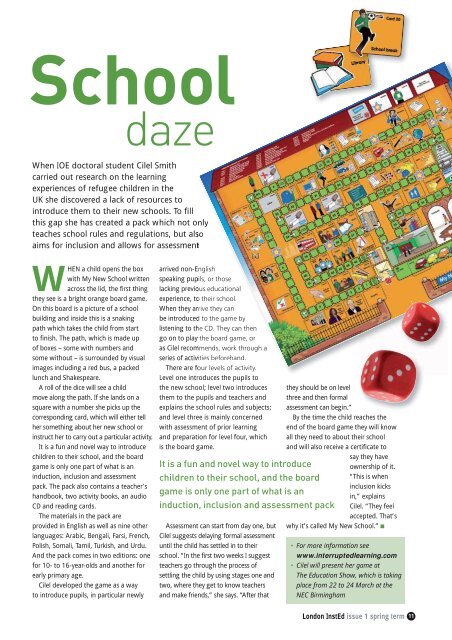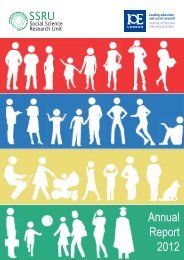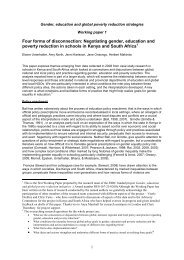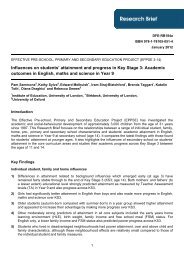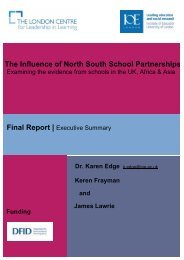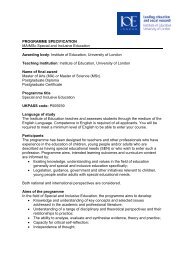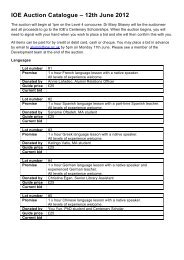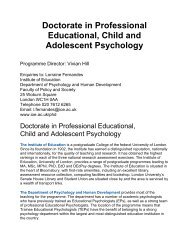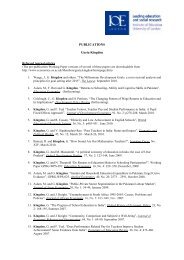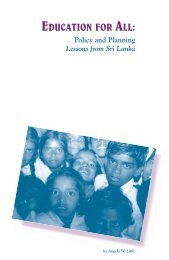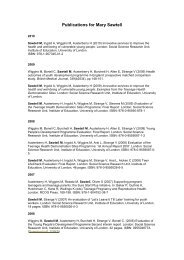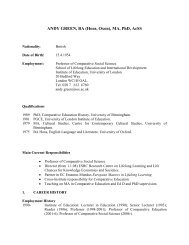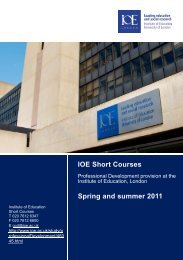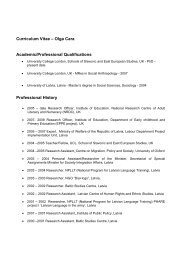Issue 1 - Institute of Education, University of London
Issue 1 - Institute of Education, University of London
Issue 1 - Institute of Education, University of London
You also want an ePaper? Increase the reach of your titles
YUMPU automatically turns print PDFs into web optimized ePapers that Google loves.
School<br />
daze<br />
When IOE doctoral student Cilel Smith<br />
carried out research on the learning<br />
experiences <strong>of</strong> refugee children in the<br />
UK she discovered a lack <strong>of</strong> resources to<br />
introduce them to their new schools. To fi ll<br />
this gap she has created a pack which not only<br />
teaches school rules and regulations, but also<br />
aims for inclusion and allows for assessment<br />
WHEN a child opens the box<br />
with My New School written<br />
across the lid, the first thing<br />
they see is a bright orange board game.<br />
On this board is a picture <strong>of</strong> a school<br />
building and inside this is a snaking<br />
path which takes the child from start<br />
to finish. The path, which is made up<br />
<strong>of</strong> boxes – some with numbers and<br />
some without – is surrounded by visual<br />
images including a red bus, a packed<br />
lunch and Shakespeare.<br />
A roll <strong>of</strong> the dice will see a child<br />
move along the path. If she lands on a<br />
square with a number she picks up the<br />
corresponding card, which will either tell<br />
her something about her new school or<br />
instruct her to carry out a particular activity.<br />
It is a fun and novel way to introduce<br />
children to their school, and the board<br />
game is only one part <strong>of</strong> what is an<br />
induction, inclusion and assessment<br />
pack. The pack also contains a teacher’s<br />
handbook, two activity books, an audio<br />
CD and reading cards.<br />
The materials in the pack are<br />
provided in English as well as nine other<br />
languages: Arabic, Bengali, Farsi, French,<br />
Polish, Somali, Tamil, Turkish, and Urdu.<br />
And the pack comes in two editions: one<br />
for 10- to 16-year-olds and another for<br />
early primary age.<br />
Cilel developed the game as a way<br />
to introduce pupils, in particular newly<br />
arrived non-English<br />
speaking pupils, or those<br />
lacking previous educational<br />
experience, to their school.<br />
When they arrive they can<br />
be introduced to the game by<br />
listening to the CD. They can then<br />
go on to play the board game, or<br />
as Cilel recommends, work through a<br />
series <strong>of</strong> activities beforehand.<br />
There are four levels <strong>of</strong> activity.<br />
Level one introduces the pupils to<br />
the new school; level two introduces<br />
them to the pupils and teachers and<br />
explains the school rules and subjects;<br />
and level three is mainly concerned<br />
with assessment <strong>of</strong> prior learning<br />
and preparation for level four, which<br />
is the board game.<br />
It is a fun and novel way to introduce<br />
children to their school, and the board<br />
game is only one part <strong>of</strong> what is an<br />
induction, inclusion and assessment pack<br />
Assessment can start from day one, but<br />
Cilel suggests delaying formal assessment<br />
until the child has settled in to their<br />
school. “In the first two weeks I suggest<br />
teachers go through the process <strong>of</strong><br />
settling the child by using stages one and<br />
two, where they get to know teachers<br />
and make friends,” she says. “After that<br />
they should be on level<br />
three and then formal<br />
assessment can begin.”<br />
By the time the child reaches the<br />
end <strong>of</strong> the board game they will know<br />
all they need to about their school<br />
and will also receive a certificate to<br />
say they have<br />
ownership <strong>of</strong> it.<br />
“This is when<br />
inclusion kicks<br />
in,” explains<br />
Cilel. “They feel<br />
accepted. That’s<br />
why it’s called My New School.”<br />
For more information see<br />
www.interruptedlearning.com<br />
Cilel will present her game at<br />
The <strong>Education</strong> Show, which is taking<br />
place from 22 to 24 March at the<br />
NEC Birmingham<br />
<strong>London</strong> InstEd issue 1 spring term 11


